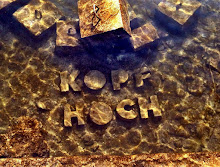"This diner was built over FIFTY years ago!!" joked Eddie Izzard about the lack of history in America. I get it and it's funny, but I don't believe that it's simply that people in the US don't revere historical buildings or history in general. The US is a young nation, we couldn't possibly have buildings as old as Europe's, because we've not been around as long. When I met my mother-in-law, she seemed to share Eddie Izzard's views, when it came to American cities. To be fair, she'd mostly spent her time in LA and NY. When my husband graduated from college, he and his folks came down to see me in Philadelphia. There, my mother-in-law was able to see some of the oldest buildings in the states and was reminded that, in Boston, she had seen evidence of historical buildings. I enjoyed Philadelphia and it's history. Though I felt sad and embarrassed for the portly fellows who had to stroll through humid summers in Ben Franklin costumes, I liked seeing the birthplace of my nation every day.To get to my favorite sushi place, I passed by the Liberty bell and Independence Hall.
Now I'm in Europe, "where the history comes from" (or so said Eddie Izzard) and I appreciate the historical preservation of buildings. More important than my location, my age has changed my appreciation of history. This year is the 20th anniversary of the Berlin wall and the 15th anniversary of Tianman Square. I have lived through both of those occasions. I remember them, on some level. Three years ago was the 20th anniversary of the Challenger falling from the sky and I remembered being a four year when it happened. I experience a different feeling on these anniversaries, compared to those that I did not live through. On the anniversaries of Hiroshima, I was able to call to mind the melted statue at the UN in New York, but it was still something distant for me. On anniversaries like D-day or JFK's assassination, I like to hear the stories, but have absolutely no personal connection. If anything, I feel quite critical, considering what I know what came next, instead of what it meant for the people living through it.
I am almost 28 and it seems that I am now better able to understand the historical marking of time through events, because I've begun to personally mark time through events. I am now old enough to look back and see that it is 13 years since I had my lower-intestine removed, I will celebrate my second wedding anniversary, it is 10 years since I moved out of my mother's house. I understand the difference of a 5 year anniversary, compared to a 10 year anniversary, when remembering something painful. When California postponed the announcement of the decision of whether or not to overturn proposition 8 (banning gay marriage), it was in recognition of the power that a day can have for the collective conscience. Who knows how such an announcement would have been received on the anniversary of the White Night riots. (The riots in 1979 in response to the sentenceing of the man who killed an important gay activist.) Sitting in a cinema in Switzerland over two years ago, watching a preview for the World Trade Center, I whispered "It's too soon". Words that I never quite understood before.
I wonder what our generation's impact will have on the commemoration of significant days. I, myself, have been known to celebrate silly anniversaries. Trying to find a fun way to celebrate my husband's 26th birthday, I arranged it as an anniversary of his 6th birthday. We went to a dinosaur museum, as he had done 20 years before, and had pizza with his friends. As gifts, he received Lego's and an RC airplane (he'd wanted to be a pilot when he was 6). Others in my age group are wearing The Berlin Wall fashion line, celebrating the anniversary of the Berlin wall in spray-painted 80's style T-shirts. That makes me nervous. I understand that the fall of the wall was a positive thing and that a certain amount of levity is appropriate, but I wonder how my peers will affect the tradition of paying tribute in the future. We who cover songs and adapt classic literature, we who think that Regan coined the phrase "city on a hill", we who buy new models of electronics as often as possible, we will dictate the method of remembering for the next generation. "Where were you?" is a phrase often used when looking back to a historic event, but it is typically only part of it. I fear that my young adults, who remember where they were on September 11th 2001 and on the day a black man became president of the US, will focus on that aspect and not the change in the world that each global event has had.
Abonnieren
Kommentare zum Post (Atom)

Keine Kommentare:
Kommentar veröffentlichen